

AlphaLISA SureFire Ultra Human Phospho-RIPK1 (Ser320) Detection Kit, 500 Assay Points
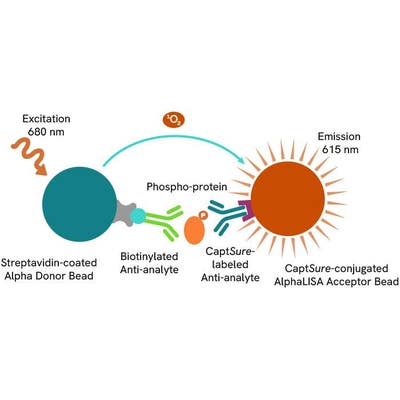
AlphaLISA SureFire Ultra Human Phospho-RIPK1 (Ser320) Detection Kit, 500 Assay Points
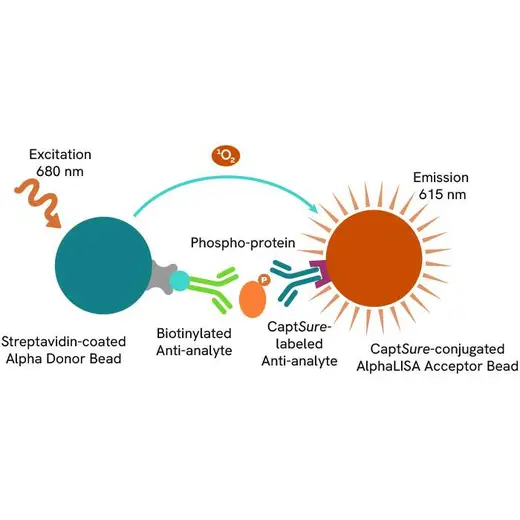

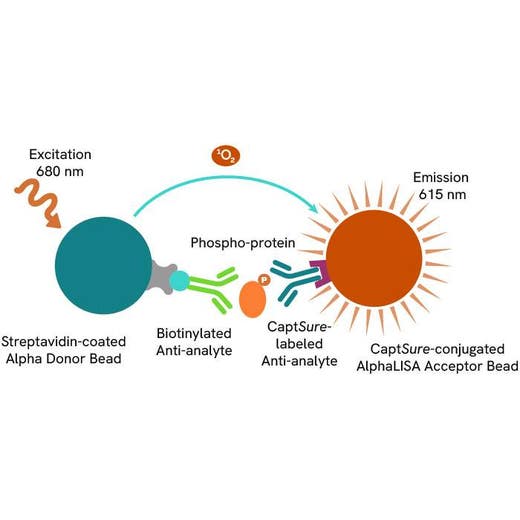

The AlphaLISA™ SureFire® Ultra™ Human Phospho-RIPK1 (Ser320) assay is a sandwich immunoassay for quantitative detection of phospho-RIPK1 in cellular lysates using Alpha Technology.
For research use only. Not for use in diagnostic procedures. All products to be used in accordance with applicable laws and regulations including without limitation, consumption and disposal requirements under European REACH regulations (EC 1907/2006).
| Feature | Specification |
|---|---|
| Application | Protein Quantification |
The AlphaLISA™ SureFire® Ultra™ Human Phospho-RIPK1 (Ser320) assay is a sandwich immunoassay for quantitative detection of phospho-RIPK1 in cellular lysates using Alpha Technology.
For research use only. Not for use in diagnostic procedures. All products to be used in accordance with applicable laws and regulations including without limitation, consumption and disposal requirements under European REACH regulations (EC 1907/2006).


AlphaLISA SureFire Ultra Human Phospho-RIPK1 (Ser320) Detection Kit, 500 Assay Points


AlphaLISA SureFire Ultra Human Phospho-RIPK1 (Ser320) Detection Kit, 500 Assay Points


Product information
Overview
Receptor-interacting serine/threonine-protein kinase 1 (RIPK1) is a critical regulator of cell death and inflammation. RIPK1 can mediate cell survival, apoptosis, or necroptosis depending on cellular context and post-translational modifications. In its active form, RIPK1 promotes necroptosis by interacting with RIPK3 and MLKL. Dysregulation of RIPK1 activity is implicated in inflammatory and neurodegenerative diseases, as well as in cancer.
The AlphaLISA SureFire Ultra Human Phospho-RIPK1 (Ser320) Detection Kit is a sandwich immunoassay for the quantitative detection of phospho-RIPK1 (Ser320) in cellular lysates, using Alpha Technology.
Formats:
- The HV (high volume) kit contains reagents to run 100 wells in 96-well format, using a 60 μL reaction volume.
- The 500-point kit contains enough reagents to run 500 wells in 384-well format, using a 20 μL reaction volume.
- The 10,000-point kit contains enough reagents to run 10,000 wells in 384-well format, using a 20 μL reaction volume.
- The 50,000-point kit contains enough reagents to run 50,000 wells in 384-well format, using a 20 μL reaction volume.
AlphaLISA SureFire Ultra kits are compatible with:
- Cell and tissue lysates
- Antibody modulators
- Biotherapeutic antibodies
Alpha SureFire Ultra kits can be used for:
- Cellular kinase assays
- Receptor activation studies
- Screening
Specifications
| Application |
Protein Quantification
|
|---|---|
| Automation Compatible |
Yes
|
| Brand |
AlphaLISA SureFire Ultra
|
| Detection Modality |
Alpha
|
| Host Species |
Human
|
| Molecular Modification |
Phosphorylation
|
| Product Group |
Kit
|
| Shipping Conditions |
Shipped in Blue Ice
|
| Target |
RIPK1
|
| Target Class |
Phosphoproteins
|
| Target Species |
Human
|
| Technology |
Alpha
|
| Therapeutic Area |
Inflammation
|
| Unit Size |
500 Assay Points
|
How it works
Phospho-AlphaLISA SureFire Ultra assay principle
The Phospho-AlphaLISA SureFire Ultra assay measures a protein target when phosphorylated at a specific residue.
The assay uses two antibodies which recognize the phospho epitope and a distal epitope on the targeted protein. AlphaLISA assays require two bead types: Acceptor and Donor beads. Acceptor beads are coated with a proprietary CaptSure™ agent to specifically immobilize the assay specific antibody, labeled with a CaptSure™ tag. Donor beads are coated with streptavidin to capture one of the detection antibodies, which is biotinylated. In the presence of phosphorylated protein, the two antibodies bring the Donor and Acceptor beads in close proximity whereby the singlet oxygen transfers energy to excite the Acceptor bead, allowing the generation of a luminescent Alpha signal. The amount of light emission is directly proportional to the quantity of phosphoprotein present in the sample.

Phospho-AlphaLISA SureFire Ultra two-plate assay protocol
The two-plate protocol involves culturing and treating the cells in a 96-well plate before lysis, then transferring lysates into a 384-well OptiPlate™ plate before the addition of Phospho-AlphaLISA SureFire Ultra detection reagents. This protocol permits the cells' viability and confluence to be monitored. In addition, lysates from a single well can be used to measure multiple targets.
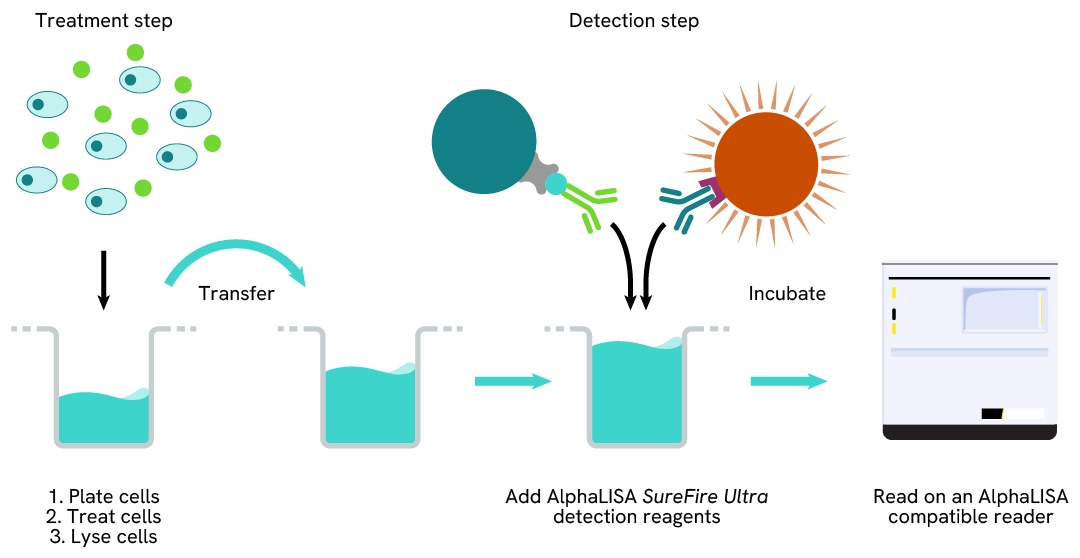
Phospho-AlphaLISA SureFire Ultra one-plate assay protocol
Detection of Phosphorylated target protein with AlphaLISA SureFire Ultra reagents can be performed in a single plate used for culturing, treatment, and lysis. No washing steps are required. This HTS designed protocol allows for miniaturization while maintaining AlphaLISA SureFire Ultra quality.
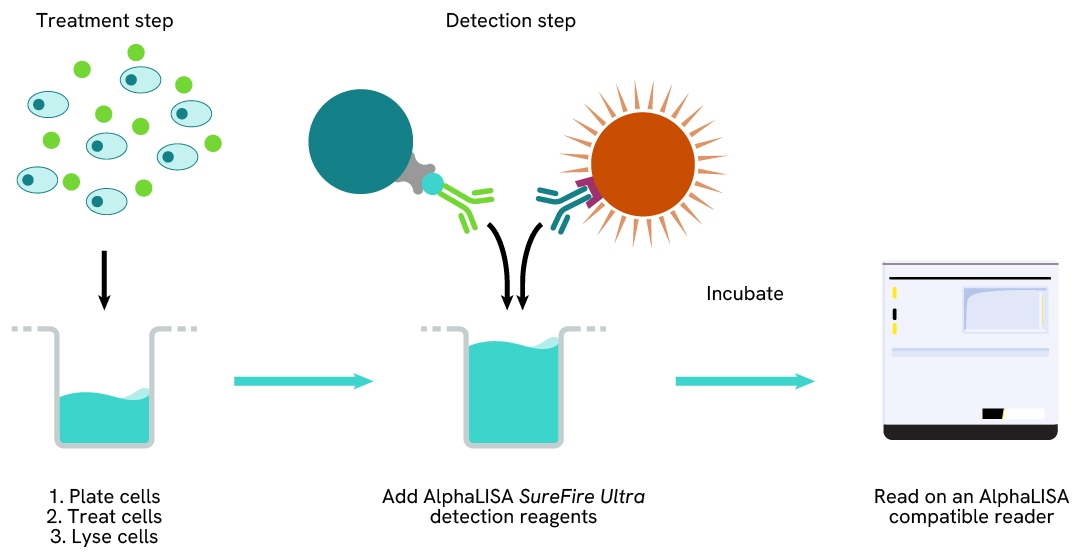
Assay validation
Activation of Phospho RIPK1 (Ser320) in TNFα treated cells
RT4 cells were seeded in a 96-well plate (40,000 cells/well) in complete medium, and incubated overnight at 37°C, 5% CO2. The cells were treated with increasing concentrations of TNFα for 15 minutes.
After treatment, the cells were lysed with 100 µL of Lysis Buffer for 10 minutes at RT with shaking (350 rpm). RIPK1 Phospho (Ser320) and Total levels were evaluated using respective AlphaLISA SureFire Ultra assays. For the detection step, 10 µL of cell lysate (approximately 4,000 cells) were transferred into a 384-well white OptiPlate, followed by 5 µL of Acceptor mix and incubated for 1 hour at RT. Finally, 5 µL of Donor mix was then added to each well and incubated for 1 hour at RT in the dark. The plate was read on an Envision using standard AlphaLISA settings.
TNFα treatment in RT4 cells triggered a dose-dependent increase in the levels of Phospho RIPK (Ser320) while Total RIPK levels remain unchanged.
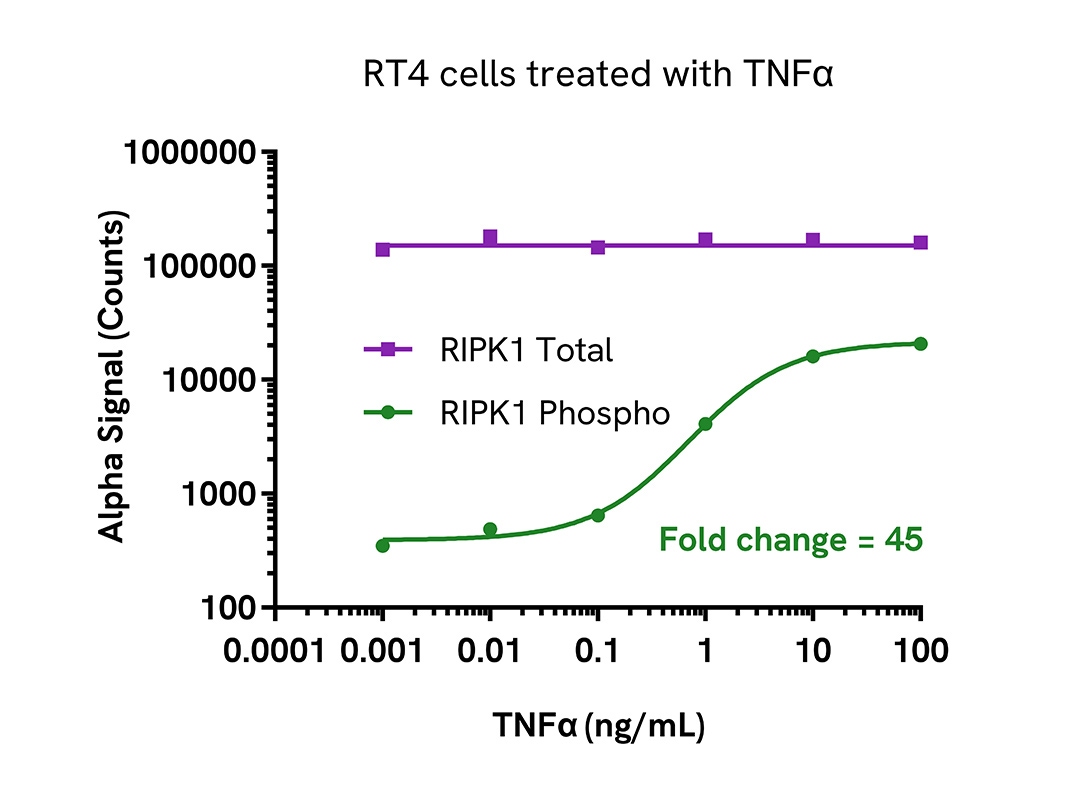
SDS, COAs, Manuals and more
Are you looking for technical documents related to the product? We have categorized them in dedicated sections below. Explore now.
- Lot NumberU18982Lot DateOctober 22, 2024
- Language-Country-
- Resource TypeManualLanguageEnglishCountry-


How can we help you?
We are here to answer your questions.

































